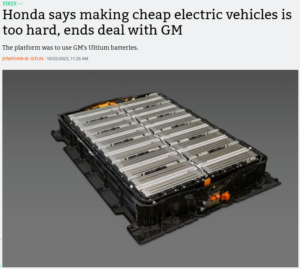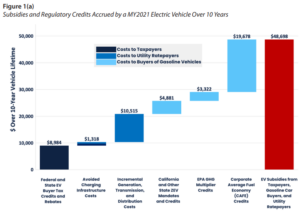This week, Honda and General Motors announced an end to their two-year collaboration in building a platform for lower-cost EVs. “We decided that this would be difficult as a business,” said Honda CEO Toshihiro Mibe.
The new Ultium lithium-ion cells to be used in the program didn’t pan out and costs remained stubbornly high. During the first three quarters of 2023, a mere 6,920 Ultium-based EVs were bought by U.S. consumers.
Older EVs are also hurting. Chevrolet is ending production of the Bolt EV, which uses older and more expensive batteries, and shifting the plant that made it to electric truck production.
This is despite all-in EV subsidies that now total more than $48,000 per vehicle according to a new TPPF analysis:
Panicked politicians who want to force-feed consumers EVs are responding with EVEN MORE subsidies to entice consumers – piling state subsidies on top of federal.
New Mexico Gov. Michelle Lujan Grisham is pushing a new EV tax credit and has mandated that 82% of new cars in the state must be zero-emission by 2031. California already offers rebates of up to $9,500, Maine offers up to $7,500, and Colorado offers $5,000.
These mandates and incentives will only create shortages of the cars and trucks people actually want.
This smells to us like another fiasco similar to the infamous Ford Edsel flop – the car that all the experts said would jump out of the new car showrooms onto Americans’ driveways. Instead of selling 400,000 per year, Americans bought just 10,000 before the model was discontinued.
The Car Industry’s Most Famous Flop – Until Now


